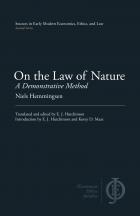One of the more pervasive myths surrounding the Protestant reformations is that they represented a wholesale rupture with the moral traditions that preceded, particularly with respect to natural law. In an influential recent study, for instance, Brad S. Gregory claims that “those who repudiated the Roman church uncoupled the medieval discourse on natural rights from the teleological Christian ethics within which it had been embedded.”
Scholarship on this point has not always been so blinkered, however. John T. McNeill wrote in 1946 that “there is no real discontinuity between the teaching of the Reformers and that of their predecessors with respect to natural law.” One of the important implications of this is that the diversity of the late medieval period with respect to natural law came over in all its dynamism into the Reformation era as well. Contrary to many historical narratives, there is no single, unvariegated, and univocal school of natural law coming from the medieval scholastics. There is, in fact, diversity and variegation around some common ideas and themes.
Korey D. Maas, in a recent piece for Public Discourse, takes on another set of popular mischaracterizations of the relationship between Protestantism and natural law. In an incisive analysis, Maas shows that “neither Luther nor his colleagues and heirs ‘abandoned’ natural law. Nor did they recast it in a voluntarist mold. They embraced and defended it along entirely traditional lines.”

As we eagerly await the appearance of Hemmingsen on natural law in English, be sure to read Maas’ piece, and check out a review essay I published some years back, “Natural Law and Protestantism—A Review Essay,” which surveys some recent works that are helpfully revising the historical record.

